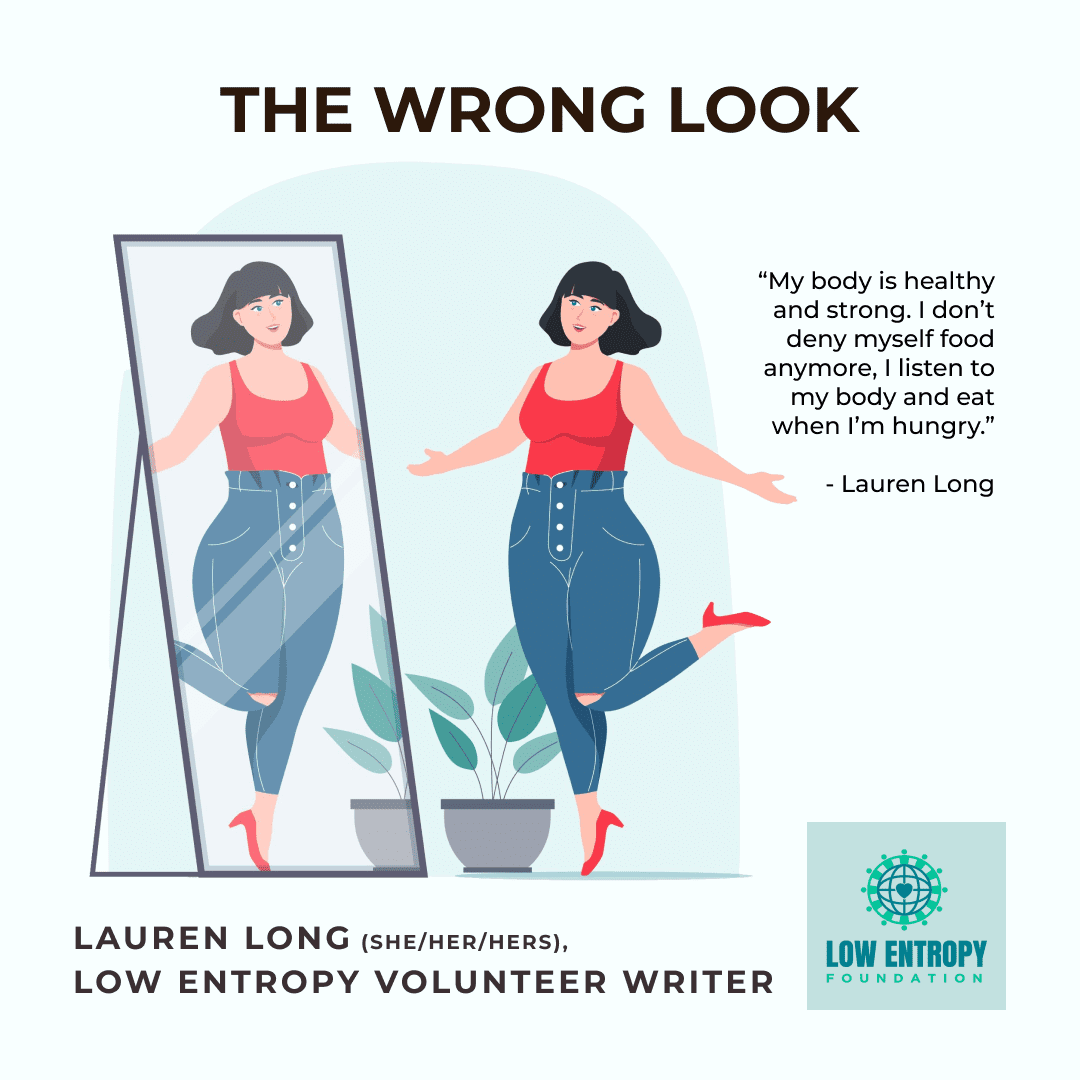Lauren Long (she/her/hers), Volunteer Blog Writer
Sadly, beauty standards are mainstream in the society and culture we live in. Beauty standards and cultural pressures on our bodies affect us all, and I am no stranger to having my body judged.
As a battle cry against those ideals, I wrote and published “It’s Been a Long Time Coming, But I Finally Have a Positive Body Image,” to my blog Empowered Prose and Ponders.
I believe in a healthy, positive body image, even more so when I’m around people who resort to dangerous eating behaviours because they are unhappy with how they look.
Women in the entertainment industry face constant criticism about their bodies. Taylor Swift, Jennifer Lopez and Pamela Anderson are very open about their body image struggles in their respective Netflix documentaries, as is Britney Spears in her incredible memoir The Woman In Me.
If you’re looking for honest conversations, I highly recommend them all. As a woman, I find it degrading to be asked how you feel about certain body parts and have your weight commented on.
Taylor said it best when she talked about the double standards of beauty in Miss Americana. “There is always a standard of beauty you’re not meeting. Because if you’re thin enough, you don’t have the ass everyone wants, but if you have enough weight on to have an ass, your stomach isn’t flat enough.”
Taylor also faced judgment for her portrayal of body shaming in her “Anti-Hero” music video, sparking a controversy. Some accused her of being fatphobic, while others supported Taylor calling out the beauty standard of shaming bodies that don’t fit the ideals we have all been indoctrinated with.
I agree with Taylor that meeting society’s “approved” body images is unattainable, because no matter how you look at it, there is no way to win.
At some point, you have to decide for yourself what your definition of healthy is.
When I was in high school, I was talking to a friend while waiting for class to start when I heard a male voice obnoxiously ask, “Are you anorexic?”
I didn’t realize he was talking to me until my friend defended me. I also had a female classmate body shame me by saying, “Good, you’ve gained some weight,” after we returned from Christmas break.
Teenagers and children can be the cruellest creatures alive, and that can be said for some adults as well. I acted like my high school years didn’t exist for the longest time.
As a result, I blocked those memories out, but they resurfaced when I was body shamed as an adult.
Body shamed: “The action or practice of mocking or stigmatizing someone by making critical comments about the shape, size, or appearance of their body.”
When I was a teenager, I didn’t know there was a term for putting people down because of the way their bodies looked.
As an adult, I wasn’t body shamed until I started pole dancing. I have struggled with my weight and body image for most of my life, and pole dancing has not only kept the weight off, but given me body confidence.
The more I trained, lost inches were replaced with muscle and definition. People began to notice, and for the most part, the comments were constructive. They would say, “You look really good!” or “You look healthy!” Those comments are okay, because they recognized my efforts.
However, because some people have zero tact, I received non-constructive comments like these: “You’re looking slim and trim.” “You look like you’ve lost weight!” “You have the perfect body!”
When I heard these comments, I wondered what was wrong with my body before. The answer: nothing.
The perfect body doesn’t exist, and comments like these cause people to carry body shame.
They were said by family members, which is much worse than hearing them from insensitive teenagers.
I’m sensitive to comments about my body because I watched a family member body shame another and make them cry. It triggered me and led to a discussion with my counsellor about how body shaming affects body image.
I still have bad body days but I snap myself out of them by repeating, “My body is healthy and strong. I don’t deny myself food anymore, I listen to my body and eat when I’m hungry.”
That mantra has been very effective for me.
Jennifer Lawrence, an actress best known for The Hunger Games and American Hustle, said in an interview with the BBC in 2013, “Girls see enough of this body that we can’t imitate, that we’ll never be able to obtain, these unrealistic expectations, and this [referring to her character, Katniss Everdeen] is gonna be their hero, and we have control over that . . . It’s better to look strong and healthy.”
The body we’re born with is the only one we’re going to get. It’s taken a long time, but I refuse to allow my body to be defined by the expectations of others. This body is mine, and mine alone.
—
Born and raised in Quesnel, BC, Lauren Long is a strong advocate for mental health and overall well-being, as well as being a role model for positive body image. When she’s not writing, you can find her on the pole, the training mats or curled up with a good book.

